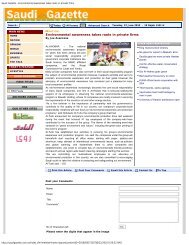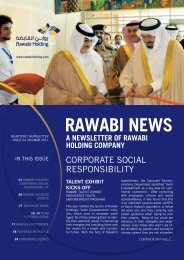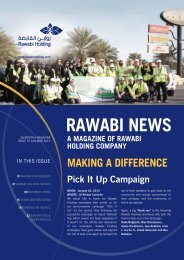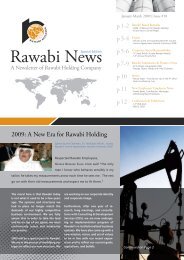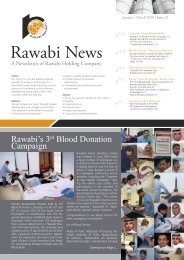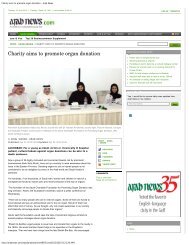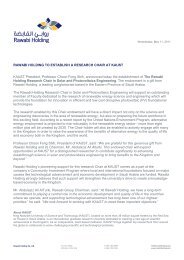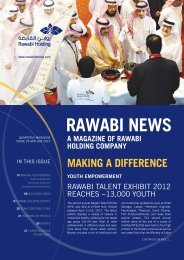Rawabi Holding Newsletter Issue 26
Rawabi Holding Newsletter Issue 26
Rawabi Holding Newsletter Issue 26
You also want an ePaper? Increase the reach of your titles
YUMPU automatically turns print PDFs into web optimized ePapers that Google loves.
TEAM CONTRIBUTIONS<br />
Hanaa Almoaibed<br />
CSR Unit Head<br />
Doing What You Love to<br />
Love What You Do<br />
Figure 1: Holland’s model<br />
<strong>Rawabi</strong> <strong>Holding</strong> CSR just launched the third leg of the Youth Empowerment<br />
“Self Discovery” programs; the <strong>Rawabi</strong> Guidance Program.<br />
Although we are applying this in high schools, what this program essentially<br />
does is train just about anyone to be a career counselor. It’s 120<br />
hours of training and implementation and practice on psychometric assessment<br />
tools that measure interests, personality profiles, priorities,<br />
values, you name it. Based on the results of a combination of these,<br />
we should be able to determine what we were born to be good at. The<br />
most important point brought across in this training is that it doesn’t<br />
matter how we measure this, since there are thousands of assessment<br />
tools out there—the tool in and of itself is useless, if you don’t know<br />
why it was developed, what it measures, and what all of that means<br />
for your cognitive style. These tools are all models to represent what is<br />
going on in our brains. And how your brain works determines what your<br />
strengths are. Some of us have done those online quizzes and taken<br />
cognitive assessment tests in the past, but I am going to go out on a<br />
limb and venture that we all more or less stumbled into what we were<br />
doing without a scientific plan outlining our futures based on our brain<br />
activity. But that is ok, for many, we don’t need to measure our likes<br />
and dislikes and use tools to model our preferences, because they are<br />
so strong that we just know. But for others, those that flip flop back and<br />
forth between college majors, career paths, and life partners for that<br />
matter, perhaps a quick model of their brain patterns might reveal why<br />
these mistakes keep recurring.<br />
So what do these models look like As<br />
mentioned, the tools used to model<br />
what’s happening inside our brains<br />
are abundant and most likely they are<br />
all useful. Common typological tools<br />
are the Myers-Briggs Type Indicator<br />
(MBTI), the Herrmann Brain Dominance<br />
Instrument (HBDI) and the Holland<br />
Occupational Themes (RIASEC).<br />
Many tools have been created using<br />
the Holland Codes, formulated by psychologist<br />
John L. Holland, who argued<br />
that “the choice of a vocation is an<br />
expression of personality”. Holland’s<br />
model has been adopted by hundreds<br />
to measure people’s cognitive preferences,<br />
and they are modeled in a<br />
handy hexagon.<br />
One of my favorite things to talk about<br />
is myself. Don’t judge me; I know that’s<br />
what you like to talk about too. We all<br />
have to exercise a little bit of self control<br />
in social settings so we don’t come<br />
off as conceited or completely self absorbed.<br />
So here it is: something you<br />
can use to find out more about yourself<br />
so you can more easily communicate to<br />
others why you feel and act in certain<br />
ways. Oh, and maybe it will also help<br />
you figure out how to be even better at<br />
what you do. I will discuss the six personality<br />
types and you can then think<br />
about where you fit on this model. Of<br />
course, you can’t fit into a box of just<br />
one personality type, but most likely,<br />
one or two of these personal styles are<br />
stronger than the rest. If you look at the<br />
hexagon you will see that R and S are<br />
on opposite ends. Those two interests<br />
are as different as they get, so you will<br />
most likely not be strongest in both.<br />
Some people are though, and that just<br />
means that you will have to be a bit<br />
more creative in the ways you exercise<br />
your profession or employ your skills.<br />
R: Realistic<br />
Realistic personalities are those who<br />
are hands-on. I’m pretty sure my son is<br />
this. But then again, he’s a year and a<br />
half old, so maybe he’s just mechanically<br />
inclined and very physical right<br />
now. Either way, if you obsessively<br />
played with trains when you were a<br />
child, this may well be where you fit.<br />
The types of jobs realistic personalities<br />
excel in are areas like field engineers,<br />
graphic design, information technology,<br />
dentistry, and environmental science.<br />
Don’t forget, you need to have<br />
20 <strong>Rawabi</strong> News <strong>Issue</strong> <strong>26</strong> Jul-Sep 2011<br />
<strong>Rawabi</strong> News <strong>Issue</strong> <strong>26</strong> Jul-Sep 2011<br />
21



